The Importance AACSB
The Association to Advance Collegiate Schools of Business (AACSB) – the Association for the Advancement of Collegiate Schools of Business – is a prestigious, global, non-profit organisation whose main goal is to improve the quality of business science education.
AACSB International’s membership includes educational institutions, companies and other entities from around the world dedicated to the advancement of management education (just over 1,800 at the end of January 2025). Members of the organisation and also holders of AACSB accreditation include: Massachusetts Institute of Technology, Columbia University, Harvard University, Yale University, London Business School, Erasmus University Rotterdam, Maastricht University and the University of Ljubljana.
Detailed information on the essence of AACSB International is available at https://www.aacsb.edu/about-us.
Accreditation activities
One of the main activities of AACSB International is the accreditation worldwide of higher education institutions providing business curricula for undergraduate, masters and doctoral programmes.
The subjects of accreditation conducted by AACSB International are:
- curricula;
- broadly understood organisation of studies;
- academic achievements, qualifications and structure of the staff employed;
- implementation of various forms of international cooperation;
- teaching and research base;
- administrative service.
Achieving this prestigious accreditation means that an educational institution is able to meet the rigorous quality standards developed and updated by AACSB International.
As of the end of January 2025, nearly 1,050 institutions from nearly 70 countries, 6% of all business schools in the world, held AACSB International accreditation, including: Massachusetts Institute of Technology, Columbia University, Harvard University, Yale University, London Business School, Erasmus University Rotterdam, Maastricht University and the University of Ljubljana.
In Poland, only three universities have so far been awarded the AACSB accreditation (apart from UMK, Kozminski University and the University of Warsaw also have it). Nicolaus Copernicus University in Toruń is the first public university in Poland with AACSB accreditation.
It should be noted that the university’s membership in AACSB (educational membership) is necessary for the university to apply for accreditation, but it is not tantamount to having it. A full list of universities accredited by AACSB International is available at https://www.aacsb.edu/accredited.
It is also important to note that the AACSB only accredits colleges that deliver business-related undergraduate, masters and doctoral programmes.
AACSB membership is also open to entities other than higher education institutions (business membership). The AACSB does not accredit business members or courses, programmes, training, etc. delivered by such entities, even if they are business members. Information on business membership is available at https://www.aacsb.edu/businesses/business-membership.
A full list of AACSB member institutions is available at https://www.aacsb.edu/members.
Detailed information on the accreditation activities of AACSB International is available at https://www.aacsb.edu/educators/accreditation.
Benefits of accreditation
Obtaining the prestigious AACSB International accreditation comes with a number of benefits, achieved both by the educational institution itself and its staff, as well as by students studying at all levels of education.
The most important benefits achieved by an accredited educational institution and its staff include:
- elitism (only 6% of business schools in the world are accredited by AACSB);
- new opportunities for the promotion of the Faculty;
- greater recognition of the Faculty in the international education market through its presence in world rankings;
- operating according to the proven standards of the best schools in the European Union and the United States;
- opportunities for extensive international cooperation, especially in research, academic publications, teaching and exchange, with the active support of AACSB International.
For students, AACSB accreditation entails:
- a guarantee of high quality education;
- additional opportunities to participate in international student exchanges (within more than 1,000 universities from all over the world);
- the opportunity to conduct research in collaboration with foreign universities;
- increased competitiveness in the national and international labour market.



 ul. Gagarina 13a, 87-100 Toruń
ul. Gagarina 13a, 87-100 Toruń